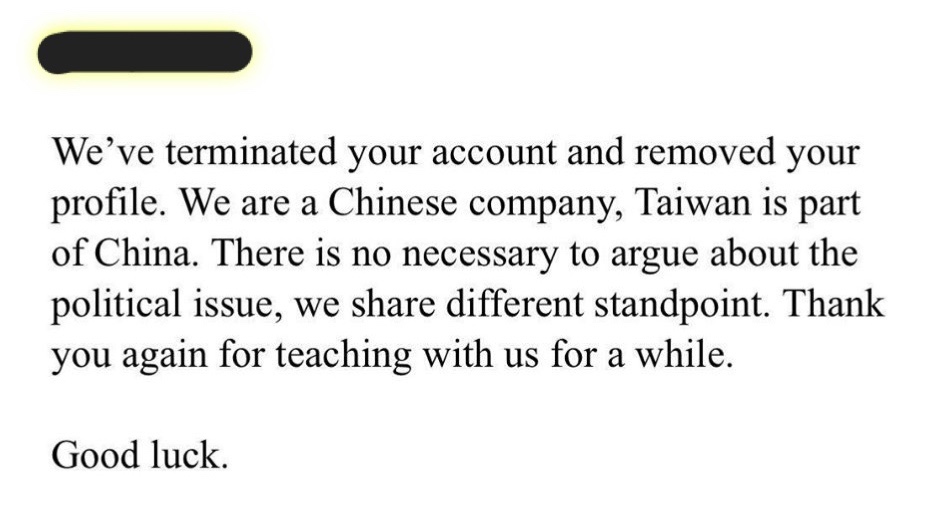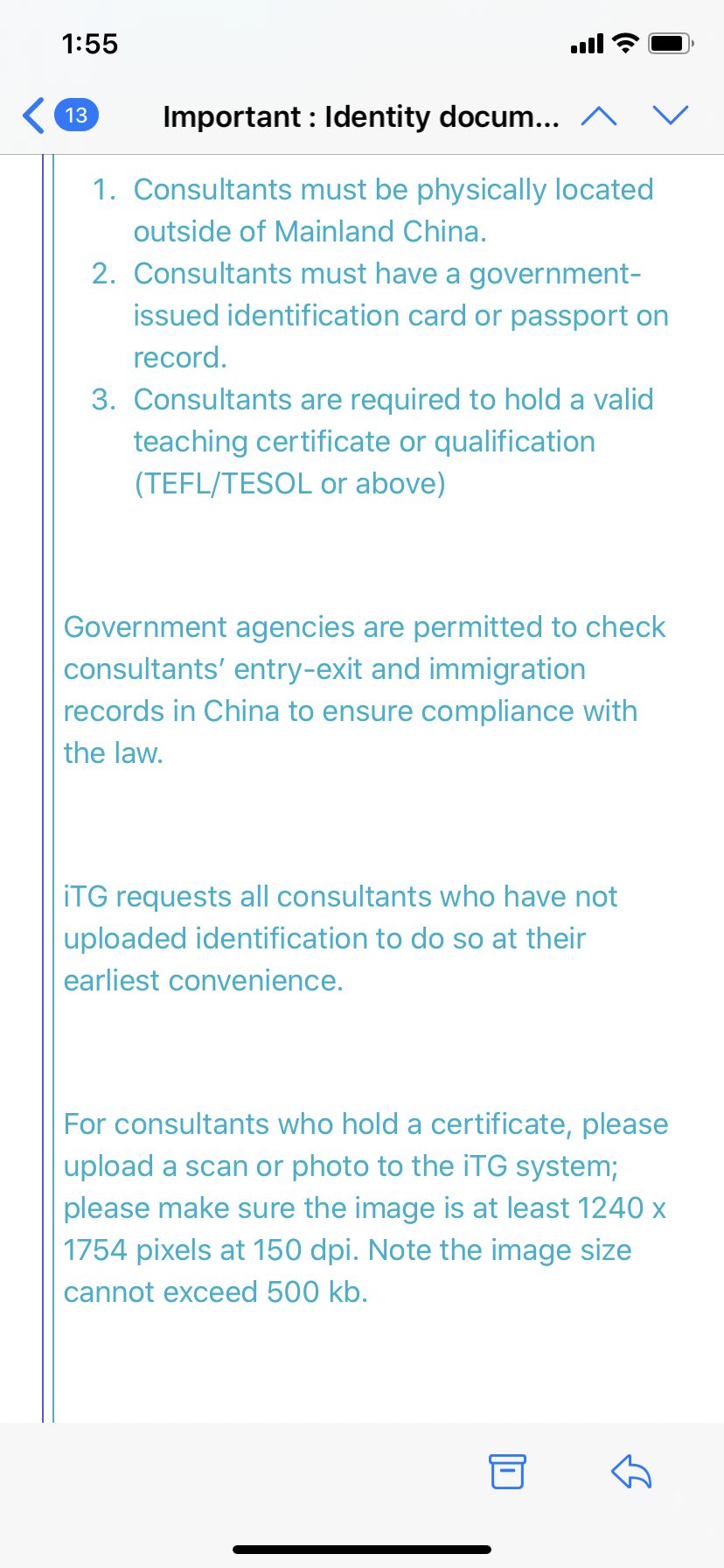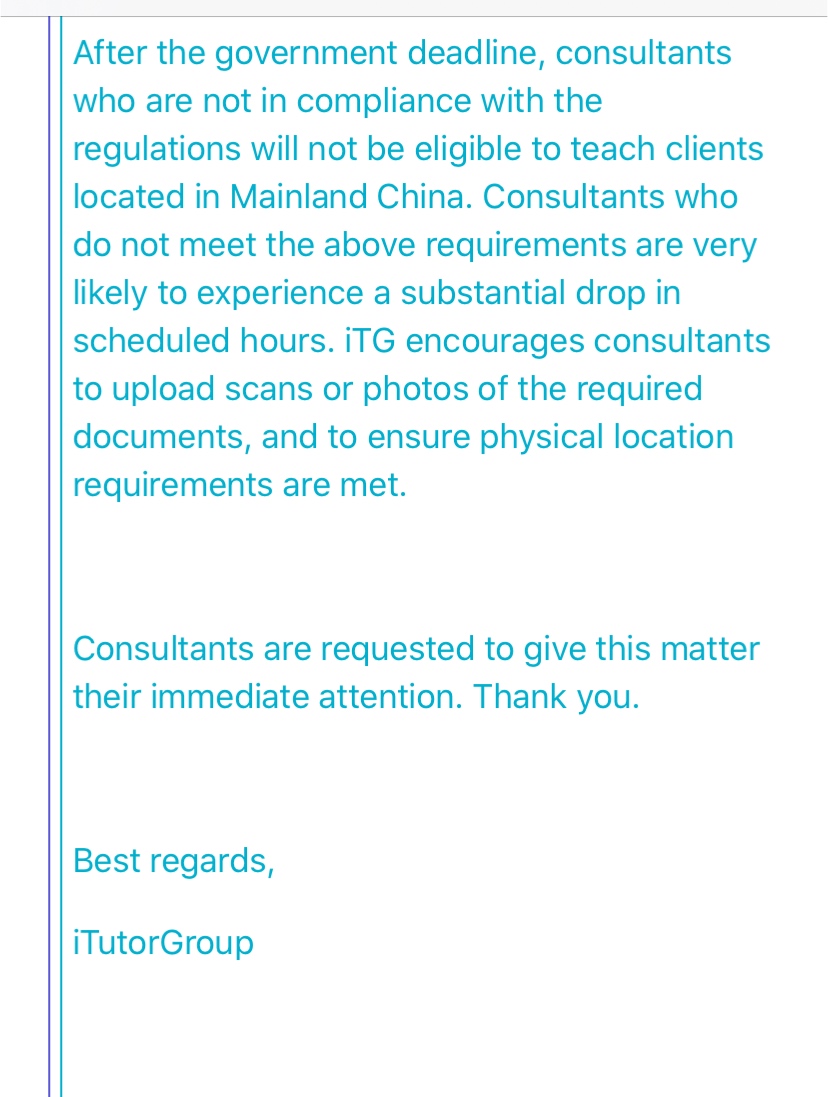 |
| Excerpt of an e-mail received by a friend from TutorABC/iTutor |
Everyone who lives in Taiwan has heard of TutorABC - it's one of the biggest online English tutoring companies in the country and advertises everywhere. I'll summarize a bit more of what people say about their working experiences there below, but it seems pretty standard for an online tutoring company.
From all this advertising in Taiwan, two mentions of Taiwan on the "About Us" page on their website, and the many Taiwanese companies they advertise as using their platform, you might think it is a Taiwanese company. It's not - it's Chinese. This isn't an exposé, it's just a fact (and if you look closely, you'll see the headquarters are in Shanghai, though apparently they used to be in Taipei[?]).
It's unclear from Internet searches when they were founded - results say 1998, 2002 or 2004, which is a bit odd. I'm not sure if the listed CEO, Eric Yang, is Chinese or Taiwanese, or if he's even still the CEO - there are rumors of a quiet takeover by Chinese company Ping An (from the previous link, in Mandarin). Bloomberg lists them as Chinese.
What's more, most of the executives seem to be Chinese (though it's not stated clearly and at least one attended a Taiwanese university.) Top-level management, from that page, appears to be exclusively male.
If you want to teach for TutorABC, you don't actually sign up with TutorABC directly - you sign up with a larger online teaching conglomerate called iTutor, which is more explicitly based in China, not Taiwan, and owns more than one 'brand' of online teaching.
This isn't a problem per se, as a company, no matter where it's based, is as good as it treats its employees. If there are no problems with ties to the Chinese government, random enforcement of Chinese law outside Chinese borders, or pushing any sort of "One China" policy on employees, then I wouldn't be writing this post. If those aren't issues, then who cares?
But, of course, I am writing this, so there must be something to report. And of course there is, as the CCP as been tightening control on business located within its borders, as well as making ridiculous demands on international businesses if they want to do any sort of business in China.
A friend of mine recently signed up to work for iTutor and as she was completing the onboarding process, received this email:
(All e-mails are reprinted here with permission of the recipient.)
Nothing from the original text was cut, but I've cropped all photos so the e-mail reads seamlessly. There's a FAQ at the end which is irrelevant to the point and is therefore not included.
Now, there's nothing wrong with most of this. In essence, iTutor (again, the parent company of TutorABC), as a Chinese company, has to obey Chinese laws when it hires consultants to teach students based on China. There's nothing particularly abnormal about that.
The problem is that the tutors are not - and, as per the email, cannot be - located in China, but they too are expected to help iTutor abide by the law of a country they don't live in by giving iTutor their personal information. Some of it is pretty standard: if I were hired by a company anywhere to work remotely, I'd expect that they'd want to see my official ID to verify that I am a real person. I'd expect that the government where they're based might want to see that ID. Showing one's teaching certification isn't that big of a deal either.
The real problem is this:
Government agencies are permitted to check consultants' entry-exit and immigration records in China to ensure compliance with the law.
Prospective tutors can make their own decision about whether they're comfortable with that - in theory they're just making sure you're not actually in China, as per the (rather strange) law, and it doesn't say they'll look more deeply than that - it's up to you whether you believe that or not. But my friend is not comfortable with it, and I wouldn't be either. Regardless of who is employing her, what right do officials in China have to check her passport to see where she's been, when she does not reside in China, is not at a Chinese border, embassy or consulate requesting entry?
That is invasive and personally, I wouldn't accept it. It goes without saying that I would not trust the Chinese government in particular with that data (though I wouldn't be very comfortable with any foreign government having such easy access to it, the PRC is on a whole other level of terrifying).
It should be a non-starter that people not working in China, even if they have contact with people in China, are not bound by Chinese law and any legal obligations are the company's problem, not theirs. But, as you know, China considers its laws to reach beyond its borders. You absolutely can be detained in China for engaging in actions that are illegal in China, even if they were undertaken in a place where they are not only legal, but protected human rights, and even if you are not a Chinese citizen. You might even be kidnapped outside of China, or be pressured, surveilled or threatened outside China, especially if you have family in China.
You might think it's overkill to say that this situation amounts to being surveilled by China while outside China, but I honestly don't think it's an exaggeration, even if most prospective online teachers are of no interest to the CCP.
My friend wisely requested that her profile be terminated as she does not wish to hand over that data to the government of a country she doesn't live in, or comply with the laws of a country she doesn't live in.
This is where enforcing a "One China" policy on employees who are not in China comes in:
And there it is.
"We are a Chinese company, Taiwan is a part of China."
This could be the personal view of the employee who replied to my friend when she requested termination, but remember, this is a Chinese company and this is the enforced (by the CCP) "viewpoint" of all Chinese companies - not just iTutor - and increasingly of all companies who want to do any business in China.
In any case, that just doesn't make sense.
If tutors must be located outside of China to work with students in China, and Taiwan is a part of China, then wouldn't all tutors located in Taiwan be barred from working with students in China?
Regarding the issue raised, then, the response simply doesn't make sense. It's unrelated. This person went out of their way to express an irrelevant opinion in an official company capacity.
Or is Taiwan only a part of China for this purpose, but not others? It seems that way. In a Bloomberg piece that praises iTutor for their success, you'll see this tidbit:
Now, Yang's company runs a host of brands. TutorABC, vipJr and TutorJrform the core of the business, teaching English to students in China, Taiwan and Japan. [Emphasis mine].
Doesn't the cognitive dissonance get to be too much sometimes? I don't know.
Regardless, iTutor hires tutors from all over the world. It would stand to reason that all of them, not just those located in Taiwan, would be asked to comply with this law and submit their passport and travel information to the Chinese authorities just to connect remotely to students in China. So what would it matter if Taiwan were a part of China for this purpose?
Prospective online tutors in Taiwan, you can do whatever you want with this information. Ignore it if you like. I have no personal opinion about TutorABC or iTutor as companies, just an opinion about the enforcement of Chinese law and the ridiculousness of "one China". But be aware that, as a Chinese company, they will ask you to abide by Chinese law - through helping them abide by it - even though you are not located in China, and data you may not want the Chinese government to have might well be handed over to them as an employee of companies like these.
And this problem isn't going to go away. Be very aware of whom you're working for, where they are based, what they are asking of you and who is going to see that information.
Otherwise, the set-up for this job is pretty standard for online teaching, especially in Asia, with Asian-style management. It's got all the pros and cons you might expect. I have no personal stake in this or opinion of them as an employer, so I won't really say anything here, except that I recommend you read the reviews on Glassdoor.
Pay particular attention to who says their interviews were perfunctory (to the point of being just a few minutes long and asking questions that should have been clear from the initial application), to those who say they were difficult or they were treated rudely. Can you spot a potential reason for the different treatment? Look as well at what people are saying about pay and treatment of teachers, and how likely it is that students will leave the positive feedback that leads to higher pay, and the charts that outline what employees say about the overall outlook for the company. Look at how the company publicly responds to these issues. You'll notice a few trends. Have fun!
Little end-note: I bet some of you are thinking "Lao Ren Cha could get sued for this!" Yeah, I considered that. I've been sued before for telling the truth (the case was dismissed before it ever got to trial - I might write about it someday as I saved all the documents). So let me clarify that reporting on what other people have said, with their consent, without malicious intent to hurt the company image, is not illegal in Taiwan. I'm reporting on what my friend said with her consent and with back-up documents and very purposely not expressing an opinion on the company itself (in truth, I don't have one), but rather the policy of complying with Chinese law outside China as it would apply to any company. I want to be quite clear that people can do whatever they want with this information; it is not an attempt to malign, insult or hurt the business of iTutor or TutorABC - it's just the truth of what they ask of their tutors, as reported to me. If you're fine with that, then no problem - I hope you enjoy working for them.





1 comment:
From what I know, Jenna, both from news reports and scuttlebutt from inside Columbia, the Taichung adult English center (where I worked long ago) whose owner brothers long ago founded Tutor ABC and, eventually, iTutor, the entire group since 2018-19 has been entirely Chinese-owned, with Ping An Insurance holding a majority of the shares (and perhaps owning all of it). For a few years before then, too, iTutor was significantly Chinese-owned (by Alibaba, the Russia-China Investment Fund, and others in a Series C investment brokered by Goldman-Sachs – which also bought shares).
From its inception, Tutor ABC was surely primarily targeted at the PRC market. Fourteen years ago, Tutor ABC teacher guidelines I read (I decided to teach only in the classroom at Columbia, not also on-line for Tutor ABC) were all in line with what you’ve described here: Don’t say this; don’t talk about this, that, or the other thing … with most of the proscriptions obviously foremost aimed at CCP/PRC sensitivities.
So yes, it’s now a Chinese company – and it was willing to be so before it became such, though I’m not at all sure that the brother owners ever aimed to lose executive control of it, which has happened.
Something interesting: Columbia, to this day, from what I know provides decent conversation practice (but yes, no structured learning program) and has a fairly-good retention rate with students; but I was told anecdotally in 2015 that Tutor ABC’s retention rate in Taiwan was under two percent; and that the case was pretty much the same in China; and that ABC was therefore, basically, employing a slash-and-burn strategy in the PRC: suck what can be gotten out of the major metropolises; then move on and do big ad campaigns in second-tier cities and drain them; then move on to third-tier cities.
Remarkable cynicism. Appalling as Xi’s policies have been and continue to be, there’s a bright side to them where Tutor ABC/iTutor is concerned: it appears that the company is now screwed.
Good post and much-appreciated.
Post a Comment